文学部(塾内用) - 慶應義塾大学-塾生HP
文学部(塾内用) - 慶應義塾大学-塾生HP
文学部(塾内用) - 慶應義塾大学-塾生HP
Sie wollen auch ein ePaper? Erhöhen Sie die Reichweite Ihrer Titel.
YUMPU macht aus Druck-PDFs automatisch weboptimierte ePaper, die Google liebt.
成績評価方法:<br />
Students will be graded on in-class exercises and skits (short plays),<br />
comments on the skits, and class participation, along with a quiz or exam<br />
every term. It is obvious you must come to do these things. However,<br />
just coming to class is NOT enough to pass this course. You must also be<br />
willing to answer questions and participate actively in class.<br />
質問・相談:<br />
Students are encouraged to ask questions during or after class. Asking<br />
questions will make the class more lively and interesting.<br />
英語Ⅲ上級(セ) 1単位 (春学期)<br />
英語Ⅳ上級(セ) 1単位 (秋学期)<br />
Current Issues<br />
春学期・秋学期:木4<br />
セット履修 講師 鈴木 理恵子<br />
授業科目の内容:<br />
This course will look at current issues that appear in British and<br />
American media. Students will be expected to read articles from British<br />
and American newspapers--The Guardian, The Independent, The Times,<br />
The New York Times, Newsweek--and the BBC and American news<br />
websites. In class, we will have a discussion on the chosen topics on<br />
which students will be asked to research beforehand.<br />
The main aim of this course is to develop the students’ communicative<br />
skills as well as to familiarize them with British and European culture and<br />
politics.<br />
テキスト(教科書):<br />
The articles will be chosen by both the instructor and the students.<br />
参考書:<br />
Oxford English Dictionary.<br />
授業の計画:<br />
(春学期)<br />
Day 1: Guidance<br />
Day 2: Reading newspaper articles<br />
Day 3: Reading newspaper articles<br />
Day 4: Reading newspaper articles<br />
Day 5: Reading newspaper articles<br />
Day 6: Reading newspaper articles<br />
Day 7: Reading newspaper articles<br />
Day 8: Reading newspaper articles<br />
Day 9: Presentation<br />
Day 10: Presentation<br />
Day 11: Presentation<br />
Day 12: Presentation<br />
Day 13: Presentation<br />
(秋学期)<br />
Day 1: Guidance<br />
Day 2: Comparing English newspapers<br />
Day 3: Comparing English newspapers<br />
Day 4: Comparing English newspapers<br />
Day 5: Comparing English newspapers<br />
Day 6: Comparing English newspapers<br />
Day 7: Comparing English newspapers<br />
Day 8: Comparing English and American newspapers<br />
Day 9: Comparing English and American newspapers<br />
Day 10: Comparing English and American newspapers<br />
Day 11: Comparing English and American newspapers<br />
Day 12: Comparing English and American newspapers<br />
Day 13: Comparing English and American newspapers<br />
担当教員から履修者へのコメント:<br />
Regular on-time attendance and class participation is required for this<br />
class.<br />
成績評価方法:<br />
Students will be evaluated on the basis of attendance, class participation<br />
and presentation.<br />
質問・相談:<br />
I will be contactable before and after class as well as by e-mail.<br />
41<br />
英語Ⅲ上級(セ) 1単位 (春学期)<br />
英語Ⅳ上級(セ) 1単位 (秋学期)<br />
When Cultures Meet : Culture, Adaptation, and Identity Formation<br />
春学期・秋学期:木4<br />
セット履修 講師 横川 真理子<br />
授業科目の内容:<br />
What is culture and how is it acquired? How does culture affect the way<br />
we act, think, and feel? How does switching cultures affect our identity,<br />
especially during the formative years? By focusing on children reared and<br />
educated outside the culture of their parents (Third Culture Kids/<br />
Returnees), we will see how entering or readjusting to a culture affect us,<br />
especially in forming identity.<br />
The first semester we will study the issue of Third Culture Kids, and<br />
during the second semester we will read stories written by Third Culture<br />
Kids. Please buy both textbooks in advance as they take time to acquire.<br />
Students will be expected to participate actively through giving<br />
presentations and joining in discussions. In addition, they will be asked to<br />
write papers on topics related to culture and identity.<br />
テキスト(教科書):<br />
1) David C. Pollock and Ruth E. Van Reken. Third Culture Kids : The<br />
Experience of Growing Up Among Worlds<br />
2) Faith Eidse and Nina Sichel. (eds.) Unrooted Childhoods : Memoirs of<br />
Growing Up Global<br />
参考書:<br />
Strunk and White, The Elements of Style or other style manual.<br />
授業の計画:<br />
First Semester:<br />
Weeks 1-4 Reading about Third Culture Kids and theories of cultural<br />
adjustment<br />
Weeks 5-13 Doing Presentations and writing assignments on the Third<br />
Culture Kid experience<br />
(Textbook: David C. Pollock and Ruth E. Van Reken. Third Culture<br />
Kids : The Experience of Growing Up Among Worlds)<br />
Second Semester:<br />
Weeks 1-4 Reading about Cultural identity and the Third Culture Kid<br />
experience<br />
Weeks 5-13 Doing Presentations and writing assignments on stories by<br />
Third Culture Kids<br />
(Textbook: Faith Eidse and Nina Sichel. (eds.) Unrooted Childhoods :<br />
Memoirs of Growing Up Global)<br />
担当教員から履修者へのコメント:<br />
Students taking this course are assumed to already have near-native to<br />
native competence in speaking, reading, and writing English, since all the<br />
classes, exercises, presentations and written assignments will be in<br />
English. Students are expected to attend all classes and be in class by the<br />
time the bell rings.<br />
The instructor has been educated entirely in the American school<br />
system, and has specialized in the area of education and adjustment of<br />
Japanese children abroad and on return. Those with a similar background<br />
as well as international students adjusting to Japan are encouraged to take<br />
this course.<br />
成績評価方法:<br />
Students will be evaluated on their class participation and on their<br />
assignments, particularly their presentations and the papers they write.<br />
Content and ability to express ideas will be considered important. Since<br />
the main topic of discussion will be on culture and identity, students<br />
should have some interest in these topics.<br />
質問・相談:<br />
Students will be encouraged to generate discussions by asking<br />
questions and sharing their ideas and experiences during class. They will<br />
also be given an e-mail address with which to contact the instructor.<br />
語<br />
学



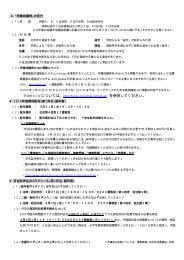
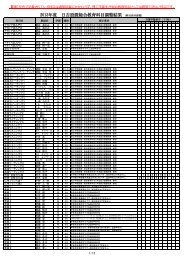
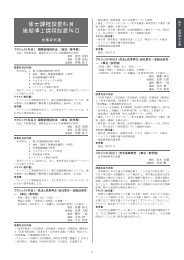
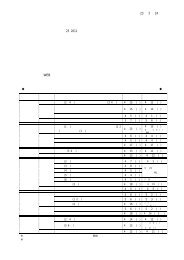
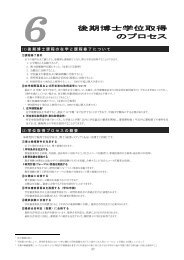
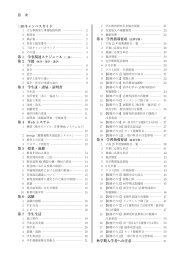



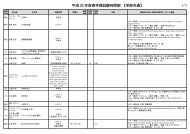

![文学部時間割表[2 ・3年生(07学則)]](https://img.yumpu.com/21046130/1/184x260/2-307.jpg?quality=85)


